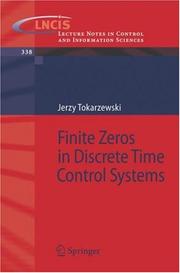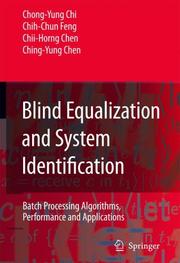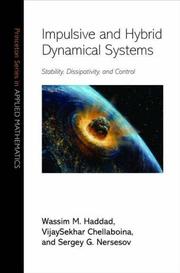| Listing 1 - 4 of 4 |
Sort by
|
Book
ISBN: 1424400538 1509093710 Year: 2006 Publisher: [Place of publication not identified] Institute of Electrical and Electronics Engineers
Abstract | Keywords | Export | Availability | Bookmark
 Loading...
Loading...Choose an application
- Reference Manager
- EndNote
- RefWorks (Direct export to RefWorks)
System analysis --- Discrete-time systems --- Civil & Environmental Engineering --- Operations Research --- Engineering & Applied Sciences --- DES (System analysis) --- Discrete event systems --- Sampled-data systems --- Digital control systems --- Linear time invariant systems --- Discrete mathematics

ISBN: 9783540334644 3540334645 3540334653 9781281391599 128139159X Year: 2006 Publisher: Berlin, Heidelberg : Springer Berlin Heidelberg : Imprint: Springer,
Abstract | Keywords | Export | Availability | Bookmark
 Loading...
Loading...Choose an application
- Reference Manager
- EndNote
- RefWorks (Direct export to RefWorks)
A state space approach to the analysis of zeros of MIMO LTI discrete-time systems is presented. The basic mathematical tools used in this analysis are the Moore-Penrose pseudoinverse and singular value decomposition of the first nonzero Markov parameter of a system. The book starts with definition of invariant zeros and goes as far as a general characterization of output-zeroing inputs and the corresponding solutions, explicit formulas for maximal output-nulling invariant subspaces and for the zero dynamics. The objective of this book is to render the reader familiar with a certain method of analysis of multivariable zeros (which goes beyond the classical approach) and related problems. The minimal mathematical background that is required from the reader is a working knowledge of linear algebra and difference equations. The reader should be familiar with the basic concepts of linear system theory.
Control theory. --- Discrete-time systems. --- Digital control systems. --- Théorie de la commande --- Systèmes échantillonnés --- Commande numérique --- Engineering. --- Systems theory. --- Control Engineering. --- Systems Theory, Control. --- Discrete-time systems --- Control theory --- Operations Research --- Civil & Environmental Engineering --- Engineering & Applied Sciences --- DES (System analysis) --- Discrete event systems --- Sampled-data systems --- Construction --- System theory. --- Control engineering. --- Robotics. --- Mechatronics. --- Control, Robotics, Mechatronics. --- Systems, Theory of --- Systems science --- Science --- Philosophy --- Mechanical engineering --- Microelectronics --- Microelectromechanical systems --- Automation --- Machine theory --- Control engineering --- Control equipment --- Engineering instruments --- Programmable controllers

ISBN: 1846282187 1846280222 Year: 2006 Publisher: London : Springer London : Imprint: Springer,
Abstract | Keywords | Export | Availability | Bookmark
 Loading...
Loading...Choose an application
- Reference Manager
- EndNote
- RefWorks (Direct export to RefWorks)
Discrete-time signal processing has had a momentous impact on advances in engineering and science over recent decades. The rapid progress of digital and mixed-signal integrated circuits in processing speed, functionality and cost-effectiveness has led to their ubiquitous employment in signal processing and transmission in diverse milieux. The absence of training or pilot signals from many kinds of transmission – in, for example, speech analysis, seismic exploration and texture image analysis – necessitates the widespread use of blind equalization and system identification. There have been a great many algorithms developed for these purposes, working with one- or two-dimensional (2-d) signals and with single-input single-output (SISO) or multiple-input multiple-output (MIMO), real or complex systems. It is now time for a unified treatment of this subject, pointing out the common characteristics and the sometimes close relations of these algorithms as well as learning from their different perspectives. Blind Equalization and System Identification provides such a unified treatment presenting theory, performance analysis, simulation, implementation and applications. Topics covered include: • SISO, MIMO and 2-d non-blind equalization (deconvolution) algorithms; • SISO, MIMO and 2-d blind equalization (deconvolution) algorithms; • SISO, MIMO and 2-d blind system identification algorithms; • algorithm analyses and improvements; • applications of SISO, MIMO and 2-d blind equalization/identification algorithms. Each chapter is completed by exercises and computer assignments designed to further understanding and to give practical experience with the algorithms discussed. This is a textbook for graduate-level courses in discrete-time random processes, statistical signal processing, and blind equalization and system identification. It contains material which will also interest researchers and practicing engineers working in digital communications, source separation, speech processing, image processing, seismic exploration, sonar, radar and other, similar applications.
Signal processing --- Discrete-time systems. --- System identification. --- Digital techniques. --- Identification, System --- System analysis --- DES (System analysis) --- Discrete event systems --- Sampled-data systems --- Digital control systems --- Linear time invariant systems --- Digital signal processing --- Digital communications --- Digital electronics --- Telecommunication. --- Computer vision. --- Computer software. --- Physical geography. --- Signal, Image and Speech Processing. --- Communications Engineering, Networks. --- Image Processing and Computer Vision. --- Algorithm Analysis and Problem Complexity. --- Geophysics/Geodesy. --- Geography --- Software, Computer --- Computer systems --- Machine vision --- Vision, Computer --- Artificial intelligence --- Image processing --- Pattern recognition systems --- Electric communication --- Mass communication --- Telecom --- Telecommunication industry --- Telecommunications --- Communication --- Information theory --- Telecommuting --- Signal processing. --- Image processing. --- Speech processing systems. --- Electrical engineering. --- Optical data processing. --- Algorithms. --- Geophysics. --- Electric engineering --- Engineering --- Computational linguistics --- Electronic systems --- Modulation theory --- Oral communication --- Speech --- Telecommunication --- Singing voice synthesizers --- Pictorial data processing --- Picture processing --- Processing, Image --- Imaging systems --- Optical data processing --- Processing, Signal --- Information measurement --- Signal theory (Telecommunication) --- Algorism --- Algebra --- Arithmetic --- Optical computing --- Visual data processing --- Bionics --- Electronic data processing --- Integrated optics --- Photonics --- Computers --- Geological physics --- Terrestrial physics --- Earth sciences --- Physics --- Foundations --- Optical equipment

ISBN: 1400865247 9781400865246 9780691127156 0691127158 Year: 2006 Publisher: Princeton, New Jersey ; Oxfordshire, England : Princeton University Press,
Abstract | Keywords | Export | Availability | Bookmark
 Loading...
Loading...Choose an application
- Reference Manager
- EndNote
- RefWorks (Direct export to RefWorks)
This book develops a general analysis and synthesis framework for impulsive and hybrid dynamical systems. Such a framework is imperative for modern complex engineering systems that involve interacting continuous-time and discrete-time dynamics with multiple modes of operation that place stringent demands on controller design and require implementation of increasing complexity--whether advanced high-performance tactical fighter aircraft and space vehicles, variable-cycle gas turbine engines, or air and ground transportation systems. Impulsive and Hybrid Dynamical Systems goes beyond similar treatments by developing invariant set stability theorems, partial stability, Lagrange stability, boundedness, ultimate boundedness, dissipativity theory, vector dissipativity theory, energy-based hybrid control, optimal control, disturbance rejection control, and robust control for nonlinear impulsive and hybrid dynamical systems. A major contribution to mathematical system theory and control system theory, this book is written from a system-theoretic point of view with the highest standards of exposition and rigor. It is intended for graduate students, researchers, and practitioners of engineering and applied mathematics as well as computer scientists, physicists, and other scientists who seek a fundamental understanding of the rich dynamical behavior of impulsive and hybrid dynamical systems.
Automatic control. --- Control theory. --- Dynamics. --- Discrete-time systems. --- Dynamical systems --- Kinetics --- Mathematics --- Mechanics, Analytic --- Force and energy --- Mechanics --- Physics --- Statics --- Dynamics --- Machine theory --- Control engineering --- Control equipment --- Control theory --- Engineering instruments --- Automation --- Programmable controllers --- DES (System analysis) --- Discrete event systems --- Sampled-data systems --- Digital control systems --- Discrete mathematics --- System analysis --- Linear time invariant systems --- Actuator. --- Adaptive control. --- Algorithm. --- Amplitude. --- Analog computer. --- Arbitrarily large. --- Asymptote. --- Asymptotic analysis. --- Axiom. --- Balance equation. --- Bode plot. --- Boundedness. --- Calculation. --- Center of mass (relativistic). --- Coefficient of restitution. --- Continuous function. --- Convex set. --- Differentiable function. --- Differential equation. --- Dissipation. --- Dissipative system. --- Dynamical system. --- Dynamical systems theory. --- Energy. --- Equations of motion. --- Equilibrium point. --- Escapement. --- Euler–Lagrange equation. --- Exponential stability. --- Forms of energy. --- Hamiltonian mechanics. --- Hamiltonian system. --- Hermitian matrix. --- Hooke's law. --- Hybrid system. --- Identity matrix. --- Inequality (mathematics). --- Infimum and supremum. --- Initial condition. --- Instability. --- Interconnection. --- Invariance theorem. --- Isolated system. --- Iterative method. --- Jacobian matrix and determinant. --- Lagrangian (field theory). --- Lagrangian system. --- Lagrangian. --- Likelihood-ratio test. --- Limit cycle. --- Limit set. --- Linear function. --- Linearization. --- Lipschitz continuity. --- Lyapunov function. --- Lyapunov stability. --- Mass balance. --- Mathematical optimization. --- Melting. --- Mixture. --- Moment of inertia. --- Momentum. --- Monotonic function. --- Negative feedback. --- Nonlinear programming. --- Nonlinear system. --- Nonnegative matrix. --- Optimal control. --- Ordinary differential equation. --- Orthant. --- Parameter. --- Partial differential equation. --- Passive dynamics. --- Poincaré conjecture. --- Potential energy. --- Proof mass. --- Quantity. --- Rate function. --- Requirement. --- Robust control. --- Second law of thermodynamics. --- Semi-infinite. --- Small-gain theorem. --- Special case. --- Spectral radius. --- Stability theory. --- State space. --- Stiffness. --- Supply (economics). --- Telecommunication. --- Theorem. --- Transpose. --- Uncertainty. --- Uniform boundedness. --- Uniqueness. --- Vector field. --- Vibration. --- Zeroth (software). --- Zeroth law of thermodynamics.
| Listing 1 - 4 of 4 |
Sort by
|

 Search
Search Feedback
Feedback About
About Help
Help News
News